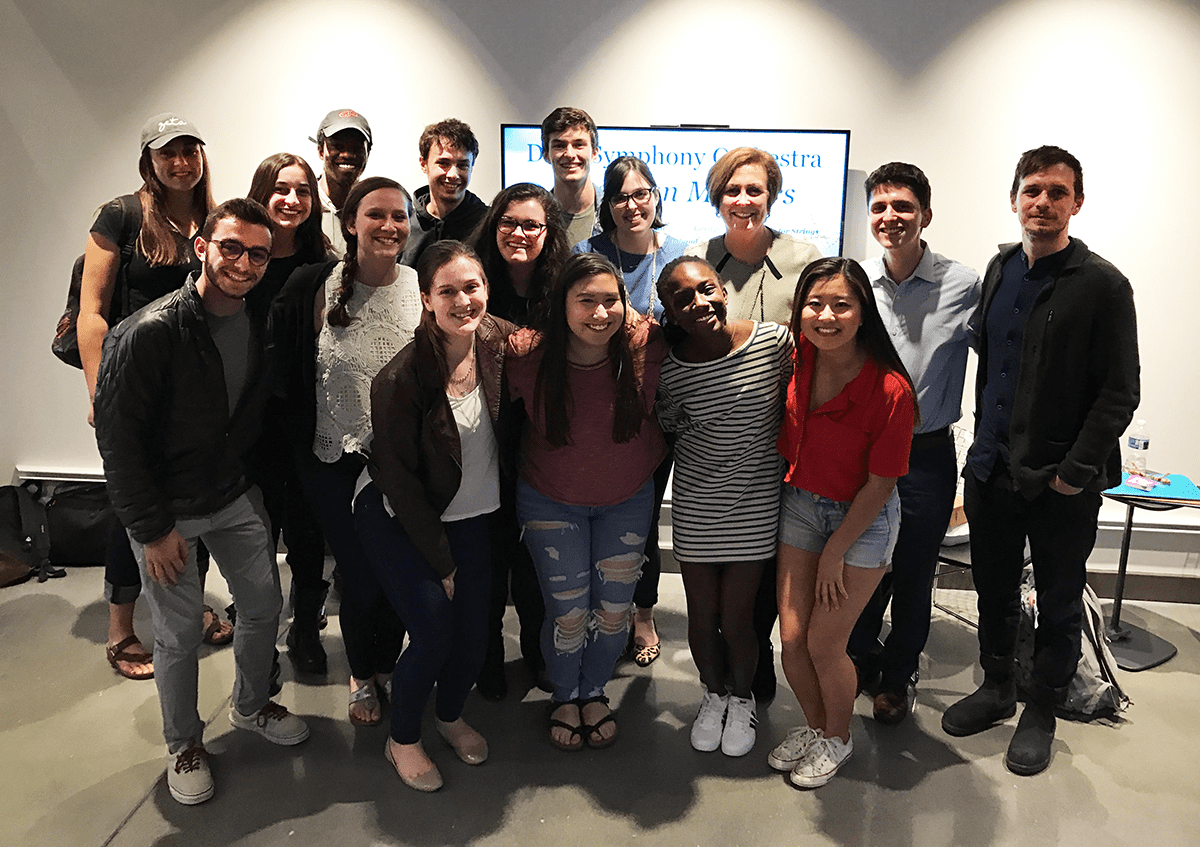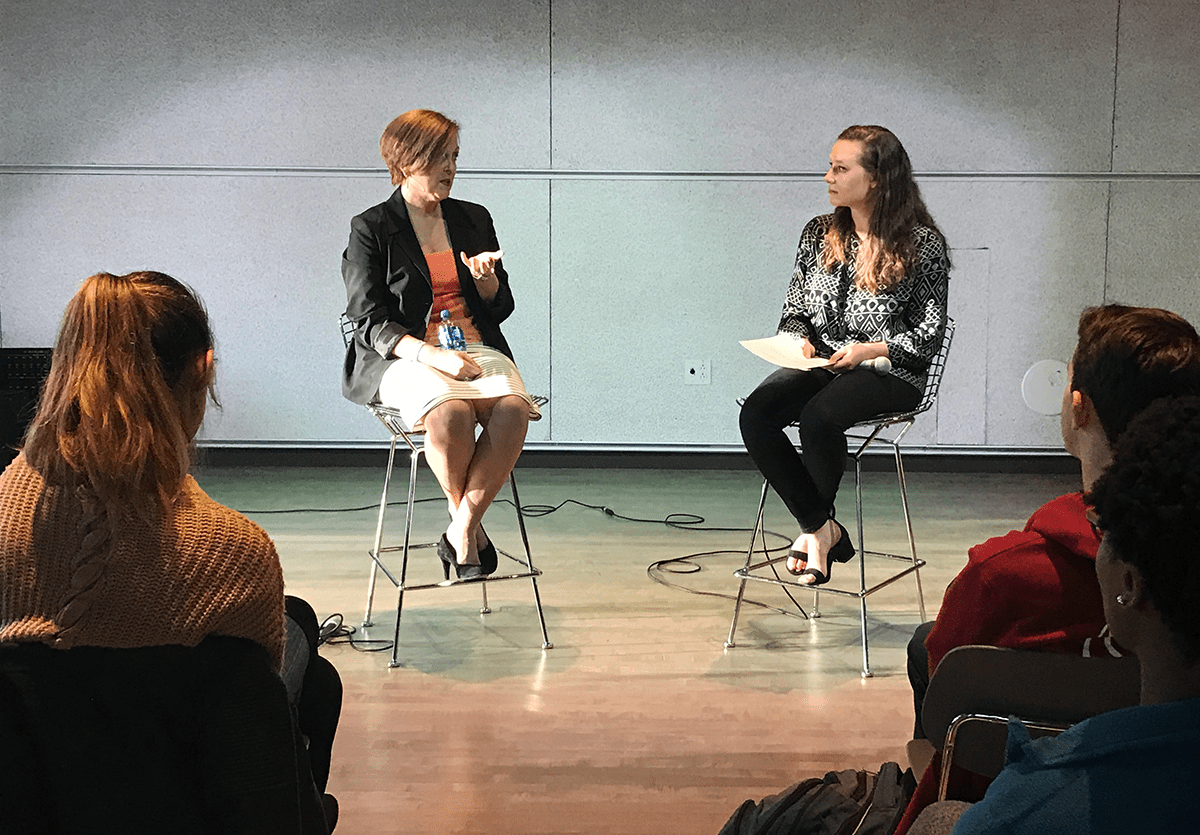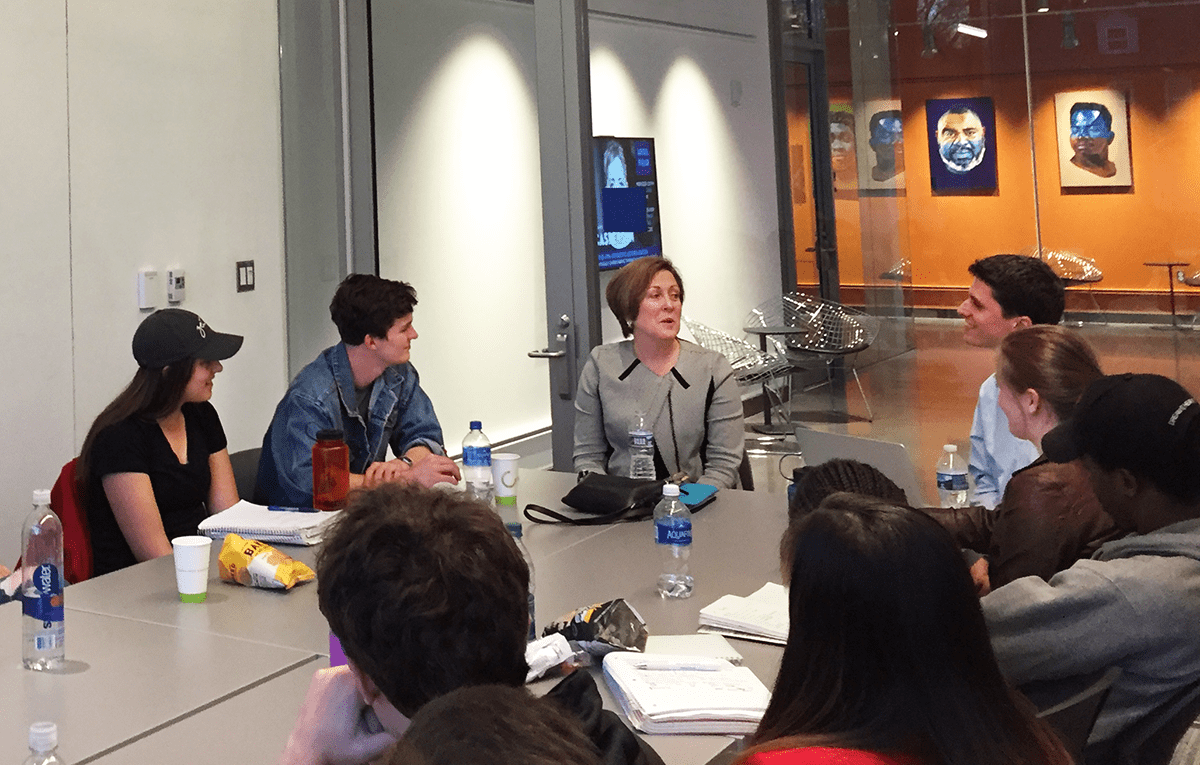
“What do you think the nation’s cultural center should be doing?” asked Deborah Rutter, president of the John F. Kennedy Center for the Performing Arts as she faced fifteen students gathered around a seminar table in the Rubenstein Arts Center. It’s a big question, with complex answers. Students in Eric Oberstein’s Introduction to Performing Arts Management and Entrepreneurship course spent this past semester considering such real-world questions across the performing arts industries.
Rutter joined the weekly class in the Ruby on April 4, helping to draw a semester rich with local and visiting guest speakers to a close. Previous visitors include Amelia Meath and Nick Sanborn of Sylvan Esso; Pierce Freelon, founder of Blackspace; and Jodee Nimerichter, executive director of the American Dance Festival.
This course was conceived by Oberstein, associate director of Duke Performances and a Grammy-winning producer. As the syllabus states, the class seeks to teach: “the foundations of performing arts management and equip students with knowledge of the business and entrepreneurial aspects of the arts and creative industries.” Admission to the seminar-sized course is by application and it was fully enrolled in its first semester.
Learn more about this new course

“It’s been a wonderful privilege to teach this inaugural class, and to have had the opportunity to assemble and learn alongside some of Duke’s brightest student arts leaders,” reflected Oberstein.
“This course is invaluable,” shared Cole Jenson (Class of 2018, Major: Neuroscience, Minor: French). “For any student hoping to get started in the field of arts administration or management, the breadth of knowledge and unique opportunities presented by this class have been crucial.”
“What started you on this path?” asked Oberstein, kicking off the class’s conversation with Rutter. A trained musician, Rutter played violin in orchestras throughout her education. She transitioned to the administrative offices of the Los Angeles Philharmonic after graduating from Stanford University. “I chose [to play] the violin, and I’m sitting here today. It was that immediate, that powerful,” she explained.
Rutter went on to become the executive director of the Los Angeles Chamber Orchestra, then led the Seattle Symphony and the Chicago Symphony Orchestra. She launched a career in arts management before one could take classes on the subject. To prepare herself for high-level leadership, Rutter earned an MBA from the University of Southern California. “Taking classes at night at USC gave me a totally new perspective on what I was doing during the day at the LA Phil,” she shared.
As president of the Kennedy Center, Rutter serves as its artistic and administrative director. She’s made it her mission to demonstrate that, as she says, “the nation’s cultural center has its doors open to all art forms.” Rutter was the first to bring hip-hop, comedy, and community-oriented yoga classes to the Kennedy Center—and she is the first woman to hold this prestigious and influential position.

Between observations on trends for presenting organizations, Rutter shared a wealth of practical, personal advice with the students. “Develop your personal taste;” “Know your institution and what they are looking for, and then be yourself;” and “Look at all relationships as opportunities for personal growth.”
“Develop your personal taste. Know your institution and what they are looking for, and then be yourself. Look at all relationships as opportunities for personal growth.”—Advice for arts leaders from Deborah Rutter
Oberstein invited Rutter and the course’s other guest speakers knowing each could provide real-world advice. “It’s my hope that this class has given students considering careers in the arts, arts management, and arts entrepreneurship a peek into the various facets of the field, and has provided them with the basic tools to apply this knowledge to their own work,” he explained. Course topics and guests touched on curating, marketing, business models, budgeting, arts law, and more.
“Our readings and conversations in class prepared us to speak with these leaders in the field and engage in exciting discussions about their current work and career trajectories,” explained Brittany Halberstadt (Class of 2019, Major: Art History, Museum Theory and Practice Concentration). “Instead of just listening, we are asking questions and having real conversations with each guest speaker during class.”
Throughout her career, Rutter made a point to see every type of live art as often as possible—these days, it’s typical for her to see at least four performances a week. “Connecting to all kinds of art gave me a different perspective on audiences and how they engage with the arts. . . People love to go see something, and they want to do it together,” explained Rutter. Live arts thrive despite the ease of live streaming—in her words, “People want to feel enveloped.”
Understanding the dynamics and magic of live performance is requisite for a successful arts administrator. Oberstein required his students to attend and respond to five performances this semester. “By attending performances together and independently, students were able to write and discuss with a critical eye the infinite details that go into presenting a quality live performance, both on and off stage,” he explained.
Understanding the dynamics and magic of live performance is requisite for a successful arts administrator.
Rutter also reminded students of the important place the performing arts hold in society. “It seems like every debate is around issues of equity, access, and inclusion these days. Arts can be central to helping the conversation around these issues. Artists hold a mirror up to society.”

Even with the growth of professional training in arts administration and its related fields, this can still be an unconventional career choice. Oberstein believes it is important to also give his students the courage they need to dive in. He ended class by asking Rutter her advice. She offered: “This is the most fascinating work that can be done. It can touch all different parts of the world—I even believe world peace is possible through the arts.” It is also demanding. “You have to be prepared to understand its benefits, because it is hard work, no matter if you’re out in front or backstage.”
Reflecting on the semester, Oberstein said: “It was a personal highlight to be able to host Deborah Rutter, one of the most visible arts leaders in this country, as our final guest speaker in class. It was fascinating to hear about the trajectory of Deborah’s impressive career, as well as the lessons she’s learned in leading some of the country’s major arts institutions.”

While visiting Duke, Rutter spoke with a variety of students and campus arts leadership. She took questions from students in Hoof ‘n’ Horn and duARTS during a public conversation in the Ruby Lounge, she visited Katie Wyatt’s “Social Entrepreneurship and the Arts” class and El Sistema USA’s Bass Connections Team, and she participated in an El Sistema USA webinar.
Oberstein intends to teach “Introduction to Performing Arts Management and Entrepreneurship” annually—follow @dukearts and @dukeperformances for news of the next semester.